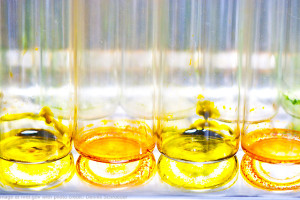Plagiarism Rife In Russian Science? Hundreds Of Academic Articles Retracted In Unprecedented Move

(Article text ©2020 RFE/RL, Inc., Radio Free Europe/Radio Liberty – rferl.org – Tony Wesolowsky – January 9, 2020 – article text also appeared at rferl.org/a/plagiarism-rife-in-russian-science-hundreds-of-academic-articles-retracted-in-unprecedented-move/30368770.html)
Ghostwritten papers. Research reprinted elsewhere under a different name. Plagiarism.
For years it’s been an open secret that all is not well in the world of academic writing in Russia.
A committee appointed by the Russian Academy of Sciences last year tried to tackle what many said was a huge task. Its report, released on January 6, confirmed what a gargantuan effort it may turn out to be
The committee said more than 800 scientific papers had been retracted since last summer, when it first pinpointed more than 2,500 dubious papers published in some of Russia’s 6,000 scientific journals.
“I think this is just the tip of the iceberg,” said Anna Kuleshova, the chairwoman of an ethics committee at Russia’s largest scientific publishing association.
The root of the problem dates back to 2012, some analysts say, when, in a decree issued shortly before his reelection, President Vladimir Putin ordered universities to pay professors more but also to publish more academic papers to boost Russia’s international clout.
To churn out more papers, many Russian universities resorted to linking academics’ pay and contracts to article productivity. However, others say the problem is older and deeper.
Not only academics, but businessmen and senior government officials — including Putin — have been accused of plagiarizing college and doctoral theses.
To sniff out suspicious scientific articles, the academy-appointed commission used software to search hundreds of Russian-language journals to check whether articles had been duplicated. It also had individuals check papers that were flagged for possible plagiarism or self-plagiarism.
The commission also spotted cases of “obscure authorship” in which academics were listed as an author of one version of a paper but not another.
The commission’s findings were largely in line with what other researchers have found, including Dissernet, a grassroots group that has focused on ferreting out plagiarism not only in Russian academics, but elsewhere.
Dissernet had no immediate comment on the committee’s finding.
Kuleshova, who is chairwoman of the Council on the Ethics of Scientific Publications of the Russian Association of Scientific Editors and Publishers, told RFE/RL’s Russian Service in an interview in October that plagiarism was widespread at Russian scientific publications.
“You can’t say exactly what percentage of scientific articles violates ethical standards, because to do that you’d need to analyze the entire database — it is technically very difficult to do,” Kuleshova said. “Over two years, about 1,000 articles were recalled that revealed violations.”
In July, the Academy of Sciences committee, formally known as the Commission for Counteracting the Falsification of Scientific Research, asked 541 journals to retract a total of 2,528 papers. As of January 6, the commission said, 263 journals had agreed to pull 869 suspicious papers.
The commission said only five journals had refused to cooperate with them, and therefore it recommended those five publications be removed altogether from the Russian Science Citation Index, a database run by eLibrary.
Don’t Ask, Don’t Tell
That could be problematic for many academics, since having papers published in indexed journals is often a prerequisite for them receiving promotions and funding, according to Science magazine.
Kuleshova said some academics were outraged by her council’s efforts. “There are people in power who don’t understand how anyone dared tell them that it is wrong to steal other people’s work. They were plagiarists and at the same time, deputies, colonels, and so on,” she said.
Dmitry Livanov, who served as education minister between 2012 and 2016, has said that revelations at the time of widescale plagiarism were hurting Russia’s reputation. “People not versed in the topic will get the idea that all academics are cheats and liars,” Livanov told the Kommersant newspaper in a 2014 interview.
The plagiarism racket has been a blight on Russian higher education for years, according to a Time magazine article in 2013, which asserted “that many politicians and businessmen pad their resumes with fake diplomas, either plagiarizing their dissertations or paying some to do if for roughly the cost of a midsize sedan.”
Putin himself, whose official resume says he holds a law degree earned from Leningrad State University in 1975, has faced charges of plagiarism.
His biography says in 1976, Putin defended a doctoral thesis on economics at the St. Petersburg State Mining Institute, a paper titled Strategic Planning Of The Reproduction Of The Mineral Resource Base Of A Region Under Conditions Of The Formation Of Market Relations.
In 2005, two researchers at the Brookings Institution in Washington got a copy of the thesis, and concluded that it had been heavily “borrowed” from a 1978 textbook written by two University of Pittsburgh professors.
“Even Vladimir Putin himself doesn’t reference or cite his own dissertation,” said Igor Danchenko, a senior research assistant at Brookings. “This fact is also omitted in his famous book of interviews, In The First Person.” “Moreover, Putin seems to evade questions about his dissertation,” he added. “He [has] never openly said that he has a degree in economics.”
Putin has never responded publicly to the allegations.
With reporting by RFE/RL’s Russian Service
[featured image is unrelated file photo]
